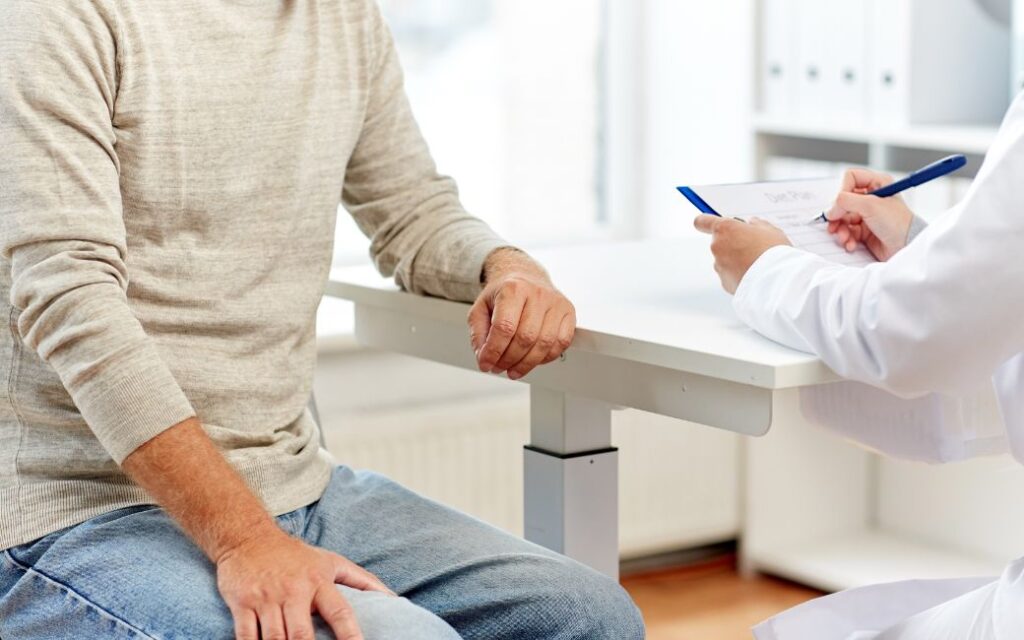Meth Addiction
Meth addiction has become a serious threat in the U.S., with its widespread availability as both a prescription medication and an illicit street drug. As the country faces a spreading addiction crisis, understanding the dangers of meth is crucial for keeping yourself and your loved ones safe.
Learning what meth addiction is, how the drug affects your body, and the risks involved with meth abuse is the first step towards breaking free from its grip. In doing so, you can make an informed decision about getting help for meth addiction.

What Is Meth Addiction?
Methamphetamine, or meth, is a stimulant drug that works by speeding up the system and producing an intense euphoric rush. The only FDA-approved versions of this drug are Adderall and Desoxyn, both of which are commonly used to treat ADHD and, in some cases, obesity.
Unfortunately, even someone with a prescription for this drug can still develop an addiction to it. With that being said, the most commonly abused form of meth is the illicit street drug, which is primarily manufactured and distributed by Mexican drug trafficking organizations.
Because of the drug’s intense stimulative and euphoric effects, it does not take long for people to become hooked on meth. Over time, repeated use of this drug can lead to dependence and eventually a fully developed addiction.
If you or someone you know is struggling with meth abuse, please reach out for help today.
Why Is Meth Addictive?
Many people can become addicted to meth after just one time using this drug. This is because meth works by flooding the brain with dopamine, creating an intense euphoric and stimulating high that can keep the person coming back for more.
Unfortunately, the more they use the drug, the more their body will become adjusted to its effects, requiring more and more meth to achieve the desired high. This is called tolerance and is the predecessor to addiction. As someone continues to abuse meth, their body will become dependent on it, requiring continued access to the drug to function normally.
If the person stops taking meth after a dependence has formed, this can cause severe withdrawal symptoms. In most cases, individuals will continue taking meth in order to avoid experiencing these withdrawal effects. Unfortunately, this creates a vicious cycle of abuse, in which their addiction only gets worse over time.
What Are the Signs and Symptoms of Meth Addiction?
Methamphetamine addiction can have a devastating impact on a person’s physical, mental, and emotional health. The signs and symptoms of meth addiction can vary depending on the severity of the addiction and the individual’s use patterns.
However, some common physical signs and symptoms of meth abuse include:
- Increased energy and alertness
- Decreased appetite and weight loss
- Insomnia
- Restlessness and agitation
- Dilated pupils
- Increased heart rate and blood pressure
- Impaired coordination or motor skills
- Dry mouth
- Skin sores and infections
- Tooth decay and gum disease
In addition to these, many people will also display behavioral signs and symptoms of meth addiction, including:
- Engaging in risky or impulsive behaviors
- Neglecting personal hygiene and responsibilities
- Engaging in secretive or deceptive behaviors
- Stealing or borrowing money to support meth use
- Associating with other meth users
- Avoiding family and friends
Finally, those struggling with a benzodiazepine addiction may show psychological signs and symptoms of their substance abuse, such as:
- Difficulty concentrating and remembering things
- Impaired judgment and decision-making skills
- Paranoia and delusions
- Hallucinations
- Depression
- Anxiety
- Irritability
- Mood swings
- Social isolation
If you are concerned that you or someone you know may be addicted to meth, it is important to seek professional help. Meth addiction is a treatable condition, and there are many resources available to help people overcome it.
Meth Addiction Facts & Statistics
A study conducted by the National Institute on Drug Abuse found that among people aged 12 or older in 2021, an estimated 2.5 million people reported having used methamphetamine in the past 12 months. Of these cases, about 1.6 million people fit the criteria for a methamphetamine use disorder.
Furthermore, approximately 32,537 people died from an overdose involving psychostimulant drugs, primarily methamphetamine, within this same year. Unfortunately, this trend has not diminished over the years, emphasizing a serious need for increased access to addiction treatment and prevention services.
The Link Between Meth and Mental Health Disorders
There is a strong relationship between meth and mental health disorders. Those struggling with attention deficit hyperactivity disorder (ADHD) are often victims of meth addiction, usually starting their abuse after being prescribed a stimulant medication for their symptoms.
Of course, this relationship can go both ways. Many people who abuse meth find that this drug causes new or worsening pre-existing mental health symptoms, particularly anxiety, paranoia, and intense mood swings.
Because of the complex relationship between meth and mental health disorders, it is important for those struggling with an addiction to this substance to seek treatment that is capable of addressing both of these issues at the same time.
Self-Assessment: Am I Addicted?
When Do You Need Meth Addiction Treatment?
Methamphetamine addiction is a serious problem that can have devastating consequences for your physical and mental health, as well as your overall quality of life. If you are concerned that you or someone you know may have a meth addiction, it is important to seek professional help.
There are several signs that you may need meth addiction treatment, including:
- You are unable to control your meth use, which means that you continue to use meth even though it is causing problems in your life.
- You are experiencing physical or mental health problems as a result of your meth, including things like addiction, psychosis, heart problems, or stroke.
- Your meth use is causing problems in your relationships, whether this be with your family, friends, or coworkers.
- Your meth use is causing problems with your finances, including job loss, debt, or legal problems.
If you are experiencing any of these signs, it is important to seek professional help. Meth addiction is a serious condition, but there are many treatment options available to help you overcome your substance abuse and get your life back on track.
How Long is Meth Addiction Treatment?
Meth addiction treatment can vary in length depending on the severity of the addiction, co-occurring mental health conditions, and individual needs. However, most people with meth addiction will benefit from a comprehensive treatment plan that lasts anywhere from 30 to 90 days.
It is important to keep in mind that your recovery will be a life-long commitment. However, it is one that will be well worth the effort, as you will be able to lead a happier, healthier, and overall better life free from meth addiction.
Have any questions?
What Is Meth Addiction Treatment Like?
Treating a meth addiction will require intensive and comprehensive care that addresses each aspect of the person’s substance abuse. While everyone’s recovery journey will look different depending on their specific needs, you can expect your treatment process to include:
- Detoxification: This is the first step in treatment and involves safely removing meth from the body. Detoxification usually takes place in a medical setting and can last anywhere from 7 to 10 days.
- Inpatient treatment: This is a residential treatment program that provides intensive care for people with meth addiction. Inpatient treatment typically lasts for 30-90 days and includes services such as therapy, medication management, and other support services.
- Outpatient treatment: This is a less intensive treatment program that allows people to continue living at home while attending therapy and other support services and typically lasts for 12-18 months.
After completing a treatment program, many people with meth addiction benefit from ongoing support services, such as sober living homes, support groups, and therapy. What is most important is that you are continuing to receive support when maintaining long-term sobriety.
Meth Addiction Treatment at
Royal Life Centers
When you receive treatment at Royal Life Centers, you will have access to comprehensive and holistic care that aims to restore your mind, body, and spirit. You will have access to a variety of treatment options, including (but not limited to) residential inpatient treatment, outpatient care, therapy, and aftercare services.
Our individualized treatment programs provide the personalized care you need to address each aspect of your addiction and have the best chance of achieving long-term recovery. You can reach out to our treatment team and learn how to start your recovery today!
Are you looking for help with addiction? Let us support you on the path to lasting recovery
Meth Addiction Treatment in Washington
Royal Life Centers at Spokane Heights offers comprehensive and compassionate care in the beautiful Pacific Northwest, providing a safe and supportive setting for the beginning stages of your recovery from meth addiction. As part of our mission to provide high-quality, holistic care to those struggling with addiction, Royal Life Centers treats clients like family and works with them to provide individualized and effective treatment.
It is never too early to start your recovery journey; reach out to us now to learn more about how our treatment approach can be a great fit for you. We are here to help you every step of the way! Reach out to us by filling out a secure contact form or calling us at 888-907-0898.
Looking for Crystal Meth Addiction Treatment Services?
If you or someone you love is struggling with meth addiction, please reach out to us to find out more about how our meth detox services can help. We work with most private insurance policies and we have affordable self-pay rates if you do not have insurance. Give us a call and we will figure out the best treatment plan for you or your loved one.
Because We Care.

Would you like more information?
If you or someone you know has a substance use disorder, we hope you’ll begin your journey with us at Royal Life Centers.



















